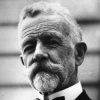Henry Cabot Lodge

Henry Cabot Lodge
Henry Cabot Lodgewas an American Republican Senator and historian from Massachusetts. Lodge received his PhD in history from Harvard. Lodge was a long-time friend and confidant of Theodore Roosevelt. Lodge had the roleof the first Senate Majority Leader. He is best known for his positions on foreign policy, especially his battle with President Woodrow Wilson in 1919 over the Treaty of Versailles. Lodge demanded Congressional control of declarations of war; Wilson refused and blocked Lodge's move to ratify the treaty...
NationalityAmerican
ProfessionPolitician
Date of Birth12 May 1850
CountryUnited States of America
I have loved but one flag and I can not share that devotion and give affection to the mongrel banner invented for the League of Nations.
For we, too, have our ideals, even if we differ from those who have tried to establish a monopoly of idealism.
You may call me selfish if you will, conservative or reactionary, or use any other harsh adjective you see fit to apply, but an American I was born, an American I have remained all my life.
It sets its face rightfully against the doctrines of the Anarchist and the Communist, who seek to solve the social problems not by patient endeavor, but by brutal destruction.
Internationalism, illustrated by the Bolshevik and by the men to whom all countries are alike provided they can make money out of them, is to me repulsive.
If a man is going to be an American at all let him be so without any qualifying adjectives, and if he is going to be something else, let him drop the word American from his personal description.
True Americanism recognizes the enormous gravity of the social and labor problems which confront us.
We would not have our politics distracted and embittered by the dissensions of other lands.
Contrast the United States with any country on the face of the earth today and ask yourself whether the situation of the United States is not the best to be found.
Standing, as I believe the United States stands for humanity and civilization, we should exercise every influence of our great country to put a stop to that war which is now raging in Cuba and give to that island once more peace, liberty, and independence.
Washington's entire honesty of mind and his fearless look into the face of all facts are qualities which can never go out of fashion and which we should all do well to imitate.
Lincoln did more than any other man to put the stamp of righteousness, to put the stamp of compassion, on the name of America.
Strong, generous, and confident, she has nobly served mankind. Beware how you trifle with your marvellous inheritance, this great land of ordered liberty, for if we stumble and fall freedom and civilization everywhere will go down in ruin.
Whatever may be said as to our relations to some other countries, I think the relations of this country to Spain offer no ties of gratitude or of blood.